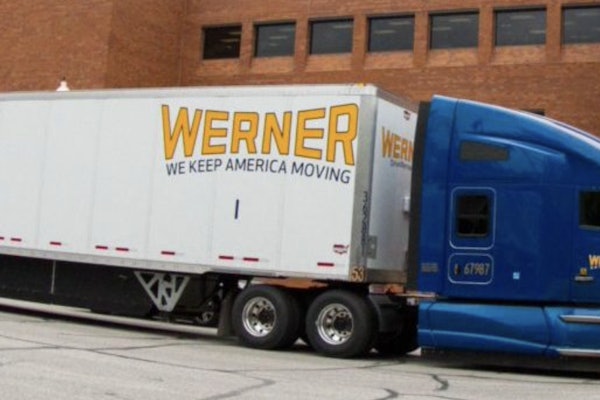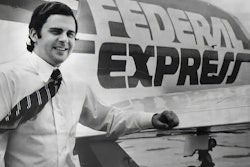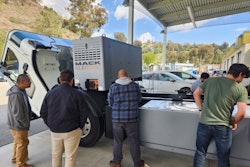 The company institutes a new driver pay structure to help neutralize uncontrollable impacts of the latest hours-of-service rule.
The company institutes a new driver pay structure to help neutralize uncontrollable impacts of the latest hours-of-service rule.BUILDING A SAFETY NET
Baylor Trucking creates Minimum Pay Assurance Program for drivers
When the Federal Motor Carrier Safety Administration proposed changes to the hours-of-service rule in December 2011, many carriers took a wait-and- see approach because enforcement would not begin until July 2013 – and a court challenge was inevitable.
As the enforcement date drew nearer, carriers took a closer look at how the rule would impact capacity, utilization, productivity and customer service. While Baylor Trucking shared those interests, the Milan, Ind.-based company also was concerned with how the rule would impact pay for the drivers of its 230 company trucks, as well as its 46 owner-operators.
While drivers would keep their 11- and 14-hour daily limits for drive time and on-duty status, the 30-minute break could deduct mileage from their pay – even if drivers didn’t have to log the break against their daily limits.
The bigger impacts were a shortened workweek from 82 hours to 70 hours on-duty and limiting the restart to once per week (168 hours); the new 34-hour restart period must include two consecutive 1-5 a.m. periods, where drivers previously could use the reset period multiple times if needed.
Baylor Trucking management also saw how electronic logs could squeeze driver pay; without the buffer of using paper logs, drivers might lose available drive time while finding a place to shut down for the day. The company also considered traffic congestion, weather, detention and other issues.
Soon after FMCSA first announced the latest rule changes, Baylor Trucking management hatched plans for a new pay structure to help neutralize the impact of things that drivers could not control. The company prides itself as being a driver-oriented family business: World War II veteran Chester Baylor started the company in 1946 behind the wheel, as did Vietnam veteran Bob Baylor, the second-generation owner.
“We wanted to look at doing the right thing for our driver base,” says Cari Baylor, vice president and a third-generation family member.
Minimum Pay
Management first considered paying drivers by the hour, but due to the complexities of driver schedules,“we couldn’t figure out how to do that,” Baylor says. The company also considered activity-based pay to compensate drivers for nondriving activities such as fueling and pre-trip inspections. After several months of evaluating different scenarios, it came up with the Minimum Pay Assurance plan.
Baylor Trucking’s mileage pay begins at $0.34 and goes up to $0.42 based on driver tenure. A matrix of the company’s mileage-based pay and the qualifications of the Minimum Pay Assurance program are listed on its website and explained again to drivers during orientation. Once drivers are seated, they can go online to view their pay for the current cycle and pending pay for trips for the following week.
 Baylor Trucking drivers going through orientation attend a high-tech classroom complete with a “smart board” where they watch video clips and use a remote-control device to answer questions.
Baylor Trucking drivers going through orientation attend a high-tech classroom complete with a “smart board” where they watch video clips and use a remote-control device to answer questions.Baylor Trucking created a minimum pay program for its company drivers in three different operations: over the road, regional and local. The minimum pay for each category is $1,000, $800 and $750 per week, respectively.
To qualify for the minimum pay, OTR drivers have to meet the following conditions for a weekly pay period that starts Sunday and ends Saturday at midnight:
• 100 percent on-time service. (Management reviews circumstances beyond a driver’s control, such as traffic or weather. Being late because of going out of route would disqualify a driver.)
• Turn in all trip paperwork by mid- night Saturday. (Baylor Trucking has both terminal and truckstop scanning services available to drivers.)
• No Compliance Safety Accountability violations or preventable damage to equipment.
• 100 percent fuel compliance at authorized network fuel stops provided by the fuel recommendations on trip sheets.
• Available for a full six days (144 hours) of dispatch.
• Compliance with company performance monitoring standards.
There are a few minor differences in the qualifications for regional and local drivers. “It’s all basics,” Baylor says. “It’s not hard stuff.”
The program has benefited drivers in instances where they come up short on mileage because of shipper detention. Even if the shipper does not reimburse BaylorTrucking,“we do not think it is right for the driver’s family to feel the impact,” she says.
Other instances where drivers appreciate the assurance pay include road construction, equipment maintenance, traffic congestion and weather. When Hurricane Sandy hit the East Coast last October, many of Baylor’s drivers did not see a dropoff in pay despite the numerous road closures.
The program also benefits younger drivers; the industry typically pays drivers based on tenure and experience, but young drivers can earn as much as veteran drivers in any given week.
As an added incentive, Baylor pays its drivers $50 for having a clean U.S. Department of Transportation roadside inspection and has monthly raffle prizes for drivers who meet fuel performance goals.
Dealing with Challenges
Despite the good intentions, the Minimum Pay Assurance program has stirred some controversy.
“It is surprising to me that an effort to do the right thing to help drivers out with a budget and give them money to live by has become so challenging,” Baylor says. “We are not naïve. We played the devil’s advocate in the testing process. We just didn’t think we would receive negative feedback when we were trying to make drivers and their families whole.”
Some of the negativity comes from drivers who see the program as an entitlement. Even if they didn’t turn in their paperwork on time, they still expect to get paid $1,000 each week.
Another challenge has been to prevent drivers from “double dipping” their pay due to a technicality. If a driver was dispatched on a Friday with a 900-mile load that doesn’t empty before Saturday at midnight, the driver could qualify for minimum pay for the week. Yet the driver would be paid for the 900 miles the following week.
This technicality has led some drivers to sit on loads that have a more flexible drop schedule. Others are turning down longer dispatches because they would rather get the minimum.
For the most part, these types of behaviors are more evident among the younger drivers.“The older drivers are shocked by the behavior of younger drivers,” Baylor says. “Older drivers are proud of what they do and grateful for the job.”
Despite these challenges, management intends to keep the program in place through 2013 and beyond, but some modifications will be needed. Since the program began in February 2012, it has cost the company about $156,000 as of last month. “We do not want to make drivers anxious, but we will have to look across the board to make everyone whole,” she says.
Using technology could make one correction, Baylor says. Baylor Trucking’s dispatch software could be modified to capture the mileage of all drivers at mid- night on Saturday whether they are under dispatch or empty. Currently, the system captures the mileage only when a load is complete, or terminated.
This modification would eliminate double dipping and ensure drivers get paid for their activities in each pay cycle. A driver who is dispatched on a Friday from Indiana to Maine would get paid for 850 miles of the 900-mile trip if he had 50 miles to go by midnight Saturday.
The Minimum Pay Assurance program has made a difference in driver retention, Baylor says, and it also has helped increase driver engagement since drivers must be available for dispatch for six days each pay cycle to qualify.
While Baylor Trucking’s efforts to do the right thing for its drivers have not gone exactly as planned, the company is optimistic the kinks can be ironed out. “If people in the office can plan on a salary for a good wage, the driver should be no different,” Baylor says.











